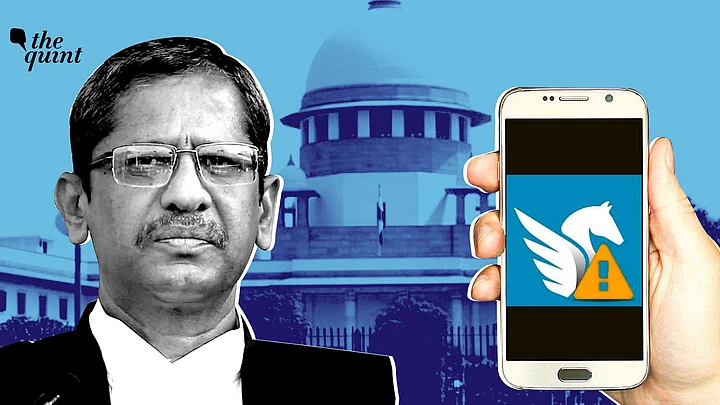An expanded three-judge bench of the Supreme Court, headed by Chief Justice of India (CJI) NV Ramana, Justices Vineet Saran and Surya Kant, briefly heard a batch of petitions on Tuesday, 10 August, seeking an independent probe into the alleged targeted surveillance using Israel-made spyware Pegasus.
Solicitor General Tushar Mehta asked for time till Friday, 13 August, to get instructions from the Centre. CJI Ramana said the court would take up the matters on Monday, 16 August as he is not available on Friday.
The bench urged parties to the case to refrain from engaging in "parallel debates" about the issue, including on social media (while not restricting them from doing so).
"Any of the parties who have come before the court, we expect them to make their arguments and answer questions in the court hall. They must have some faith in the system, rather than speaking outside. You all have come to the court and you speak through the counsels. We don't want parallel debates. You have faith in the system. There must be discipline."CJI NV Ramana
Previously, the Supreme Court on 5 August had asked the petitioners to serve copies of their petitions to the central government so they can respond as to whether notice should be issued in the matter.
The bench of CJI Ramana and Justice Kant had sought clarity on why people allegedly affected by Pegasus snooping had not filed complaints/FIRs, but also noted that "the allegations are serious if the reports are correct."
The list of cases that came up for hearing by the apex court included:
Public Interest Litigations (PILs) filed by advocate ML Sharma, journalists N Ram and Sashi Kumar, Rajya Sabha MP John Brittas, and the Editors Guild of India;
Writ petitions filed by people whose names feature on the list of potential Pegasus snooping targets, including journalists Paranjoy Guha Thakurta, SNM Abdi, and Rupesh Kumar Singh, as well as electoral reforms activist Jagdeep Chhokar.
'A War on a Country’s Citizens'
Advocate Shyam Divan representing Jagdeep Chhokar had taken the court through the background to the new media revelations, including how a whistleblower had provided the media houses with a list of potential Pegasus targets.
He argued that "this was a detailed investigative reporting project by multiple reputed media houses."
He observed that governments like that of France had relied on these reports to launch investigations and speak to Israel about the spyware. "These are therefore media reports which have high degree of credibility," he said.
"For a private citizen to be surveilled in this manner, is extremely serious," Divan argued, adding that this "amounts to a war on a country's citizens."
'Not Just a Criminal Matter'
Advocate Rakesh Dwivedi representing SNM Abdi and Prem Shankar Jha, said, “This is a matter of wide and huge dimensions. It's not a case of a single person’s phone being bugged, but is virtually a mass action. A foreign company is involved. The government might be involved. Given the global dimensions, this is a matter where this court has to be involved with the inquiry."
Dwivedi further emphasised that surveillance can be allowed, within the bounds of the law, for terrorists and serious criminals, but there was no reason to employ it against ordinary citizens and journalists. As a result, given the nature of the allegations, "this is a constitutional issue as well, not just a criminal matter."
The writ petitions filed by the alleged victims of Pegasus snooping (with forensic analysis confirmation for Guha Thakurta and Abdi) argue that this was in fact "state-sponsored illegal hacking".
The involvement of the government is presumed by them on the basis of the Centre's failure to deny purchasing and using the spyware, as well as manufacturer NSO Group's insistence that they only sell their technology to governments and state agencies.
The PILs almost uniformly seek some sort of judicially monitored probe into the allegations that Pegasus was used against Indian citizens.
Another consistent demand across the PILs and writ petitions is for the Centre to disclose conclusively whether it has acquired and used Pegasus and other similar spyware against Indian citizens.
As no lawyer from the government was present to argue against admission of the petitions, the judges then asked all the petitioners to make sure they served copies of the pleas to the Centre so that they could consider the matter further on 10 August.
What is the Pegasus Project?
Reports published since 18 July by an international collaboration called the 'Pegasus Project' – including online news portal The Wire in India – have revealed that over 300 journalists, activists, Opposition leaders, government officials, and even current Union ministers may have been potential targets of surveillance through the Israeli NSO-made Pegasus spyware over the past few years.
Forensic analysis has been able to confirm that the phones of at least ten of these people were compromised using the spyware.
While the Centre on Friday, 30 July, had said that the controversy over allegations of spying was a "non-issue", the Opposition among other parties involved has demanded answers in Parliament.
Congress leader Rahul Gandhi, former Election Commissioner Ashok Lavasa, poll strategist Prashant Kishor, as well the woman staffer who had levied sexual harassment allegations against the former Chief Justice of India Ranjan Gogoi (as well as several of her family members) were revealed as potential targets of the spyware.
(At The Quint, we question everything. Play an active role in shaping our journalism by becoming a member today.)
